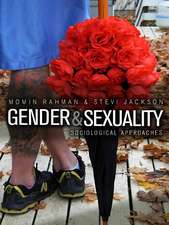Gender Inequality in the Public Sector in Pakistan: Representation and Distribution of Resources
Autor K. Chauhanen Limba Engleză Hardback – 7 aug 2014
| Toate formatele și edițiile | Preț | Express |
|---|---|---|
| Paperback (1) | 297.55 lei 3-5 săpt. | |
| Palgrave Macmillan US – 18 dec 2015 | 297.55 lei 3-5 săpt. | |
| Hardback (1) | 304.58 lei 3-5 săpt. | |
| Palgrave Macmillan US – 7 aug 2014 | 304.58 lei 3-5 săpt. |
Preț: 304.58 lei
Nou
Puncte Express: 457
Preț estimativ în valută:
58.29€ • 63.29$ • 48.96£
58.29€ • 63.29$ • 48.96£
Carte disponibilă
Livrare economică 01-15 aprilie
Preluare comenzi: 021 569.72.76
Specificații
ISBN-13: 9781137426468
ISBN-10: 1137426462
Pagini: 231
Ilustrații: XVI, 231 p.
Dimensiuni: 140 x 216 x 16 mm
Greutate: 0.44 kg
Ediția:2014
Editura: Palgrave Macmillan US
Colecția Palgrave Macmillan
Locul publicării:New York, United States
ISBN-10: 1137426462
Pagini: 231
Ilustrații: XVI, 231 p.
Dimensiuni: 140 x 216 x 16 mm
Greutate: 0.44 kg
Ediția:2014
Editura: Palgrave Macmillan US
Colecția Palgrave Macmillan
Locul publicării:New York, United States
Cuprins
Contents Acknowledgements Abstract Tables Boxes, Map and Appendices Abbreviations PART I: INTRODUCTION 1. Introduction 2. Research Issues 3. Issue of Representation 4. Access to Resources 5. Institutional Practices 6. Book Questions 7. Scope of the Book 8. Methodology 9. Data Collection and Analysis 10. Limitations of the Study 11. Organisation of the Book PART II: GENDER AND DEVELOPMENT 12. Introduction 13. Women in Development: The Politics of Integration 14. Power Neutrality 15. Women and Development: The Politics of Recognition and Access 16. Power Partiality and Materiality 17. Gender and Development: The Politics of Transformation 18. Constraints to Transformation 19. Patriarchy 20. The Political Use of Notion of Sexuality 21. State as the Rule Setter 22. Occupational Closure 23. Religion and Region 24. Some Approaches to Break the Patriarchal Trap 25. Empowerment through Credit Facilitation, not Justice 26. Need for Institutional Reforms 27. Conclusion PART III: FROM GENDER MAINSTREAMING TO TRAINING 28. Mainstreaming as a Concept 29. Training as an Approach 30. Knowledge as a Tool 31. Knowledge Transfer Sessions 32. Training: Missing Socio-political Context 33. Training: Missing Organisational Context 34. Conclusion PART IV: PATRIARCHAL PAKISTAN-WOMEN'S REPRESENTATION, ACCESS TO RESOURCES AND INSTITUTIONAL PRACTICES 35. Introduction 36. Women's Representation 37. The State and the Policies of Representation of Women 38. The Political and Historical Context of Women's Under-representation 39. The Issue of Women's Access to Resources 40. The Social Connection in Access to Resources 41. Access to Education 42. Low Demand for and Poor Supply of Education 43. Demand and Supply of Education in Azad Jammu and Kashmir 44. Access to Education beyond Demand and Supply 45. The Issue of Public Sector Policies and Practices in Pakistan 46. Sexual Harassment in the Workplace 47. The United Nations Development Program 48. Conclusion PART V: THE RESULTS: ECHOES OF PATRIARCHAL BENOVELACE, FIERCE RESISTANCE TO EQUALITY AND INSTITUTIONAL INERTIA 49. Introduction 50. Attitudes towards Representation of Women in the Public Sector 51. Attitudes towards Representation: Role of Socio-political Context 52. Attitudes towards Representation: Role of Organisation 53. Attitudes towards Extent of Quotas: Role of Training in Level of Employees 54. Attitudes towards Access to Resources 55. Attitudes towards Identification of Changes Needed: Influence of Training on 56. Cases of Discrimination Processed: Role of Gender 57. Sexual Harassment in the Public Sector: Role of Organisations PART VI: GENDER INEQUALITY: THE EFFECT OF PATRIARCHY 58. Introduction 59. Representation of Women PART VII: CONCLUSION References Appendices
Recenzii
"Chauhan's work is a timely contribution to the existing literature on Gender Inequality in Pakistan as it touches the root cause of the problem. His analysis goes beyond the usual NGO mantra of gender sensitization workshops as a panacea to gender inequality. Public policies hold the key to the changes from within, and Chauhan has substantiated that the problem lies with the patriarchal public sector that continues to support the status quo." - Tahmina Rashid, Qatar University
Addressing deeply entrenched discrimination against women has been on the international development agenda for four decades. Despite some progress, shocking levels gender-based inequality remain. In Pakistan, the challenges are particularly acute. Khalid Chauhan confronts us with those challenges and demands that we rethink the ways in which gender inequality is addressed. Gender Inequality in the Public Sector in Pakistan an important book for all those with a commitment to gender equality, social justice and good governance. It deserves to be read.-
Sharon Bessell, Australian National University
"Chauhan presents Pakistan as a crucial case of gender inequality in the public sector. The mere five percent of women in Pakistan's public workforce mirrors enormous gender inequality elsewhere in the society. Chauhan traces the adoption of `gender training' as a principal strategy for dealing with gender inequality, part of the call in development work to `get institutions right.' The book convincingly shows the gross inadequacy of gender training as main means of dealing with forms of gender inequality that are structural and deeply entrenched." - Patrick Kilby, Australian National Univeristy
Addressing deeply entrenched discrimination against women has been on the international development agenda for four decades. Despite some progress, shocking levels gender-based inequality remain. In Pakistan, the challenges are particularly acute. Khalid Chauhan confronts us with those challenges and demands that we rethink the ways in which gender inequality is addressed. Gender Inequality in the Public Sector in Pakistan an important book for all those with a commitment to gender equality, social justice and good governance. It deserves to be read.-
Sharon Bessell, Australian National University
"Chauhan presents Pakistan as a crucial case of gender inequality in the public sector. The mere five percent of women in Pakistan's public workforce mirrors enormous gender inequality elsewhere in the society. Chauhan traces the adoption of `gender training' as a principal strategy for dealing with gender inequality, part of the call in development work to `get institutions right.' The book convincingly shows the gross inadequacy of gender training as main means of dealing with forms of gender inequality that are structural and deeply entrenched." - Patrick Kilby, Australian National Univeristy
Notă biografică
Director-General, Anti-Corruption Establishment, Govt of Azad Kashmir, Pakistan









